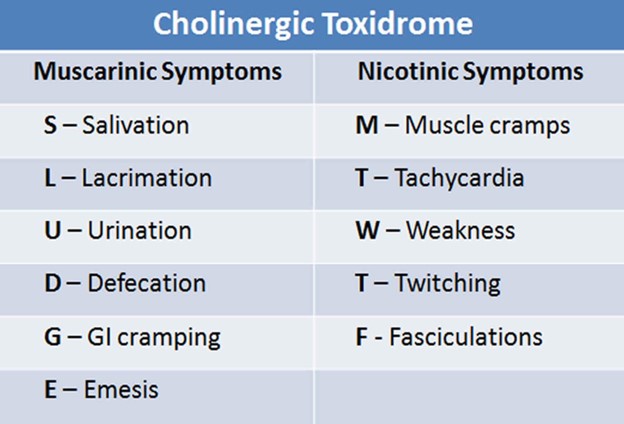A nurse is caring for a client with myasthenia gravis who is exhibiting signs of cholinergic crisis. Which medication does the nurse ensure is available to treat this crisis?
Atropine sulfate
Pyridostigmine bromide (Mestinon)
Protamine sulfate
Acetylcysteine (Mucomyst)
The Correct Answer is A
Choice A Reason: Atropine sulfate is the medication that the nurse should ensure is available to treat cholinergic crisis, as it blocks the effects of acetylcholine and reverses the symptoms of excessive parasympathetic stimulation.
Choice B Reason: Pyridostigmine bromide (Mestinon) is not the medication that the nurse should ensure is available to treat cholinergic crisis, but it is used to treat myasthenia gravis by increasing acetylcholine levels and improving muscle strength.
Choice C Reason: Protamine sulfate is not the medication that the nurse should ensure is available to treat cholinergic crisis, but it is used to reverse the effects of heparin and prevent bleeding.
Choice D Reason: Acetylcysteine (Mucomyst) is not the medication that the nurse should ensure is available to treat cholinergic crisis, but it is used to treat acetaminophen overdose and prevent liver damage.

Nursing Test Bank
Naxlex Comprehensive Predictor Exams
Related Questions
Correct Answer is D
Explanation
Choice A Reason: N0 does not indicate presence of regional lymph node involvement, but absence of it. N1 to N3 indicate increasing degrees of regional lymph node involvement.
Choice B Reason: TIS does not indicate that a tumor has been resolved, but that it is in situ, meaning that it is confined to the original site and has not invaded deeper tissues.
Choice C Reason: T4 does not indicate a tumor at its smallest size, but at its largest size. T1 to T4 indicate increasing sizes or extents of the primary tumor.
Choice D Reason: M1 indicates tumor metastasis to a single site, meaning that the cancer has spread to another organ or distant lymph node. M0 indicates no distant metastasis.
Correct Answer is C
Explanation
Choice A Reason: Placing an ice pack on the lips if they swell is not an appropriate instruction for a client who is taking allopurinol, as it may indicate an allergic reaction or angioedema, which requires immediate medical attention.
Choice B Reason: Using an OTC antihistamine lotion if a rash develops is not an appropriate instruction for a client who is taking allopurinol, as it may indicate a serious skin reaction such as Stevens-Johnson syndrome or toxic epidermal necrolysis, which requires immediate medical attention.
Choice C Reason: Drinking at least 8 glasses of fluid every day is an appropriate instruction for a client who is taking allopurinol, as it helps to prevent kidney stones and flush out uric acid from the body.
Choice D Reason: Taking the medication on an empty stomach 2 hours before meals is not an appropriate instruction for a client who is taking allopurinol, as it may cause stomach upset or nausea. The medication should be taken after meals with plenty of water.
Whether you are a student looking to ace your exams or a practicing nurse seeking to enhance your expertise , our nursing education contents will empower you with the confidence and competence to make a difference in the lives of patients and become a respected leader in the healthcare field.
Visit Naxlex, invest in your future and unlock endless possibilities with our unparalleled nursing education contents today
Report Wrong Answer on the Current Question
Do you disagree with the answer? If yes, what is your expected answer? Explain.
Kindly be descriptive with the issue you are facing.
